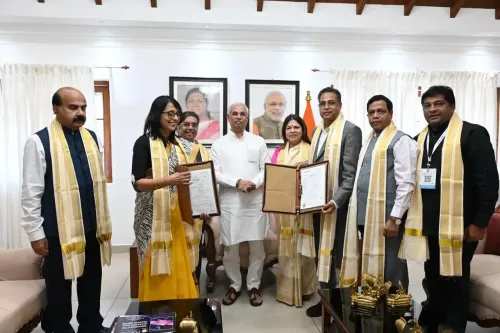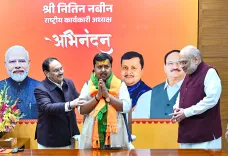How Can Wider Industry Participation Boost Digital Trust and Strengthen Infrastructure?

Synopsis
Key Takeaways
- Need for broader industry collaboration to enhance digital trust.
- Importance of addressing trust issues with the rise of AI technologies.
- Telecom operators are actively working with regulators to improve digital safety.
- Focus on connecting the last consumer in the digital inclusion journey.
- India's potential to lead in global digital standards.
New Delhi, Aug 29 (NationPress) The Cellular Operators Association of India (COAI) has reiterated its dedication to enhancing the digital network infrastructure aimed at achieving a 'Viksit Bharat by 2047'. The association has appealed for broader industry collaboration to bolster digital trust.
During an event in the capital, Ritu Ranjan Mittar, a member of TRAI, remarked, “The era of AI-enabled smartphones is approaching, and it is crucial to tackle trust issues given the challenges posed by voice AI. The Department of Telecom and TRAI are actively promoting the sector with ongoing efforts on backhaul spectrum and updated interconnect regulations.”
Rahul Vatts, Vice Chairperson of COAI and Chief Regulatory Officer at Bharti Airtel, underlined the necessity for a more extensive digital ecosystem to confront challenges associated with digital trust, as stated in a release.
“No other country experiences networks handling 25 to 28 GB of data per user as efficiently or achieves a vast 5G rollout in less than a year and a half. A major concern today revolves around digital trust and safety, especially concerning widespread digital fraud,” he noted.
Telecom operators, with support from the government and regulators, are tackling this through proactive regulations and innovative solutions, yet broader industry involvement is essential, Vatts added.
Industry leaders addressed these topics at the Digital India initiative, 'COAI Dialogues'. They unanimously agreed that stakeholders should not rest on our current achievements in digital inclusion, such as reaching 1.2 billion users or the rapid deployment of 5G, but instead aim to connect the last consumer who remains unconnected.
Discussions also covered the early monetization of next-generation technologies like 6G and their pivotal role in promoting sustainable development, along with addressing urgent issues like the increase in spam and fraudulent communications via OTT apps.
“As an emerging telecom superpower, India can set a global example by advocating for international standards, establishing interoperable frameworks, and fostering unity amid digital fragmentation. By sharing its innovations, India can assist millions globally in entering the digital age,” stated Julian Gorman, Head of Asia Pacific at GSMA.
Over 200 industry leaders and policymakers discussed regulatory innovation, the deployment of next-gen technologies, investment strategies, and inclusive connectivity.










